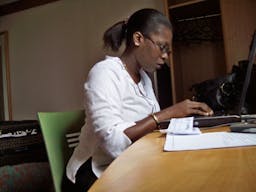Lat night's rain
Jan 21, 2015
Story
There was very heavy rain yester-night. I hear the winds were some 50 knots strong – quite unusual for Accra. The lightning and thunder were equally strong. I normally cannot sleep in a storm – or was this a tornado – because the flashes of light and sounds of thunder and rain disturb my tranquility. At a point, the winds were so heavy that I thought the roof of my house was going to come off or a branch could break off the almond tree in front of my house, fall on the roof and cause the building to cave in. All kinds of strange thoughts entered my head.
Then my mind went on to Samuel Agyemang’s award-winning documentary about street children. I thought of the 12 – 15 year old girls who lie in front of kiosks and containers, and those who sleep under tables in the markets. They are already at the mercy of mosquitoes, crawling creatures, stray dogs, rapists and several other factors. In such a storm, my head spun as I wondered, “How will they survive?” Most of these girls have traveled from Bolgatanga, Bawku, Garu and other communities in the Upper East, Upper West and Northern Regions of Ghana to make a living in Accra, with a good number also in Techiman and Kumasi. They often travel with their siblings and friends or alone to find work as porters in the market. They carry loads – sometimes very heavy loads – for shoppers. They earn between five and fifteen Ghana cedis (i.e. US$3 – 9) daily, according to a group of 12 female porters I chatted with at the Mallam Atta Market in Accra in December 2011. With these earnings, they eat a meal or two daily; they buy “M&B” (medicine) at the end of a long tiring day to regain their strength for work the next day; and “M&B” could be anything – expired drugs, analgesics, NSAIDS, antibiotics, anything a drug could be.
At night, they pay 20p or 30p for a space to lay their heads. They sleep in front of people’s shops or under shoppers’ tables when the shoppers have closed for the day. Some of them sleep in the open. For beds, they spread cardboard boxes on the floor. For pillows, they use the pans they use during the day to carry their loads. They don’t bother buying clothes and shoes because they have no place to store them. If they save any money for a day, they tie the cash in kerchiefs around their waist. A good number of these girls – we call them kayayee which is the Ga word for a female head porter – have registered with susu collectors who save their monies for them for a small fee, sometimes giving them interest at the end of a period of time. When enough money has been saved, the girls send money to their homes where their parents and siblings use these monies for their own upkeep.
A few of them have babies strapped to their backs as they carry loads across yards in the hot sun. Some of these girls had babies as a result of rape which, among them, is not termed rape but simply “sex we don’t want but have to take almost daily from the boys to help us find a place to sleep”. These babies make up the next generation of street porters; they don’t know their hometowns, and the street and market are their homes. Don’t even mention school to the mothers of these babies; how can they pay the fees or buy uniforms and shoes and books for the children?
In the storm, the mothers and babies have to contend with the same sleeping places they always use. In open air, they cover themselves with plastic sheets and try to catch some sleep. In heavy rain, they wake up and stand in front of shops or homes for shelter until the rain is over. Trust me, with such a life, there must be a whole hoard of angels and saints protecting these girls.
As I lay there last night, I imagined putting up a structure at Circle (Accra’s version of Grand Central in New York or Termino in Rome). It has six dormitories with bunk beds. Each dormitory houses 12 girls and has an adjoining bath house with four shower cubicles and 4 water closets. On the ground floor is a small kitchen with a sink and traditional kitchen stools where these girls can eat their meals. At least, they would be safe from the heavy rains. The police report that some of these girls have been trafficked, i.e. brought into the city through deception or coercion and exploited, with some of the girls working hard for monies that someone else collects! At least, they could have a more decent place to shelter them from these heavy rains. But I don’t have any money to put up the structure; the Government is aware of the plight of these girls and prefers to send them all home instead. Of course, they would return to Accra on the next available bus unless they have a good livelihood back at home where they come from.
I could not sleep well last night. And I probably won’t sleep much better these next few months because the Meteorological Services Department announces similar rains until the end of June. How can I help some of these girls?




